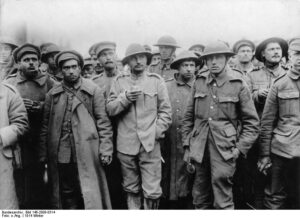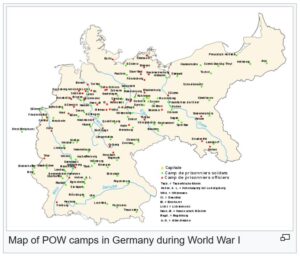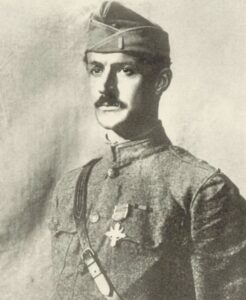
 World War I was a different era, even in the way war was conducted. Oh, war is still war, and there is wounding, bombing, killing, and capturing. Nevertheless, with one leader, Kaiser Wilhelm II, there was also compassion. After being captured and placed in a POW camp, a British officer, Captain Robert Campbell found out that his mother was dying. He couldn’t bear the thought of not seeing his mother before she passed away, and in his grief, he took a chance. He appealed to Kaiser Wilhelm II, asking to be allowed to go home to visit his mother before she died. Amazingly, Kaiser Wilhelm II granted his request, on the condition that he return to the POW camp after the visit.
World War I was a different era, even in the way war was conducted. Oh, war is still war, and there is wounding, bombing, killing, and capturing. Nevertheless, with one leader, Kaiser Wilhelm II, there was also compassion. After being captured and placed in a POW camp, a British officer, Captain Robert Campbell found out that his mother was dying. He couldn’t bear the thought of not seeing his mother before she passed away, and in his grief, he took a chance. He appealed to Kaiser Wilhelm II, asking to be allowed to go home to visit his mother before she died. Amazingly, Kaiser Wilhelm II granted his request, on the condition that he return to the POW camp after the visit.
When you think about it, once he was safely home with his mother, Captain Campbell could have simply stayed. Seriously, what could the Kaiser have done about it. Nevertheless, being an honorable man, Captain Campbell kept his promise to Kaiser Wilhelm II and returned from Kent to Germany after visiting his mother for a week. He stayed at the camp until the war ended in 1918. That was not the end of the story, however.

On August 24, 1914, then 29-year-old Captain Campbell, of the 1st Battalion East Surrey Regiment, was captured in northern France. He was sent to a prisoner-of-war (POW) camp in Magdeburg, north-east Germany. It was there that he received the heartbreaking news that his mother, Louise was dying of cancer. Captain Campbell traveled through the Netherlands and then by boat and train to Gravesend in Kent, where he spent a week with his mother before returning to Germany the same way. His mother died in February 1917.
With the kindness of the Kaiser, and a duty to honor his word, Captain Campbell, knowing that if he didn’t return, no one else would ever be given that same consideration, Captain Campbell returned to Germany. Strangely, there was no issues during his return. I suppose the Kaiser could have cleared the way previously, but it would be my guess that the Kaiser was just as shocked by the return as I am. Unfortunately, Britain wasn’t as considerate, because they blocked a similar request from German prisoner Peter Gastreich, who was being held at an internment camp on the Isle of Man. After that no other British prisoners of war were afforded compassionate leave.
As for Captain Campbell, while he felt duty-bound to return to captivity, he did not feel duty-bound to stay in 
 captivity. As soon as Captain Campbell returned to the camp, he set about trying to escape. He and a group of other prisoners spent nine months digging their way out of the camp before being captured on the Dutch border and sent back. He remained in the camp until 1918 and served in the military until 1925. Captain Campbell rejoined the military when World War II broke out in 1939 and served as the chief observer of the Royal Observer Corps on the Isle of Wight. He died in the Isle of Wight in July 1966, aged 81.
captivity. As soon as Captain Campbell returned to the camp, he set about trying to escape. He and a group of other prisoners spent nine months digging their way out of the camp before being captured on the Dutch border and sent back. He remained in the camp until 1918 and served in the military until 1925. Captain Campbell rejoined the military when World War II broke out in 1939 and served as the chief observer of the Royal Observer Corps on the Isle of Wight. He died in the Isle of Wight in July 1966, aged 81.


Leave a Reply